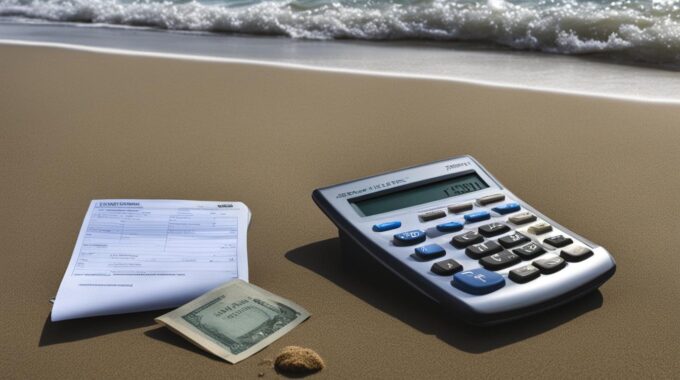At the forefront of property financing in Costa Rica, GapInvestments.com stands as a beacon for…

Understanding Costa Rica Residency Tax Implications Simplified
As an American expat considering a move to Costa Rica, it’s crucial to understand the tax implications you may face as a resident. Whether you are relocating for work, retirement, or a change of lifestyle, being aware of Costa Rica’s residency tax laws is essential for financial planning and compliance.
Costa Rica has a straightforward tax system with relatively low-income tax rates for residents. However, it’s important to note that residents are required to pay taxes on their worldwide income, including income earned within Costa Rica and from foreign sources. This can have significant implications for your financial situation and tax obligations.
While Costa Rica exempts income from non-Costa Rican sources, such as US-source income, from its tax system, US citizens must still file a US tax return regardless of where they live. It’s crucial to understand the complexities of both US and Costa Rican tax laws to ensure compliance and take advantage of any available tax benefits.
Key Takeaways:
- Costa Rica requires residents to pay taxes on their worldwide income.
- Income from non-Costa Rican sources, such as US-source income, is exempt from Costa Rican tax.
- US citizens must still file a US tax return regardless of residency in Costa Rica.
- Understanding both US and Costa Rican tax laws is essential for compliance and minimizing tax liabilities.
- Consulting with qualified tax professionals can help navigate the complexities of both tax systems.
Costa Rica Income Tax for Residents and Non-Residents
When considering a move to Costa Rica, it’s important for expats to familiarize themselves with the income tax regulations for both residents and non-residents. Understanding the tax implications can help ensure compliance and avoid any unexpected liabilities.
For Costa Rican residents, an annual income tax return must be filed, reporting all income earned within the country and from foreign sources. While taxes are typically withheld by the employer for traditional employment income, expats who receive income from sources like self-employment, rental properties, fees, commissions, royalties, or interest will need to file a tax return.
The income tax rates in Costa Rica vary depending on the type of income. Dividends and interest income, for example, are taxed at a flat rate of 15%. Capital gains, on the other hand, are generally exempt from taxation. For salaries and self-employment income, residents are subject to progressive tax rates ranging from 0% to 25%. Non-residents, including expats, are subject to flat tax rates of 10%, 15%, or 25% for salaries or self-employment income.
It’s important to be aware of additional taxes that may apply, such as property tax, property transfer tax, value-added tax, and corporate tax. The tax year in Costa Rica runs from October 1 to September 30, with tax returns due on February 15. To navigate the complexities of the Costa Rican income tax system, it’s advisable to seek the guidance of qualified tax professionals.

Note: The table below provides a summary of the income tax rates for residents and non-residents in Costa Rica.
| Income Type | Resident Tax Rate | Non-Resident Tax Rate |
|---|---|---|
| Salaries | Progressive rates ranging from 0% to 25% | Flat rates of 10%, 15%, or 25% |
| Self-Employment Income | Progressive rates ranging from 0% to 25% | Flat rates of 10%, 15%, or 25% |
| Dividends | 15% | N/A |
| Interest Income | 15% | N/A |
| Capital Gains | Exempt | N/A |
Conclusion
Although there is no tax treaty between the United States and Costa Rica, US citizens residing in Costa Rica can still navigate the complexities of taxation and potentially avoid double taxation. Utilizing IRS tax credits such as the foreign tax credit, foreign earned income exclusion, and foreign housing exclusion can help reduce the US tax liability for expats.
It’s important to note that a totalization agreement does not exist between the US and Costa Rica. Consequently, Americans living and working in Costa Rica may be required to contribute to both countries’ social security systems.
US expats in Costa Rica should familiarize themselves with the necessary tax forms they may need to file, including the US tax return, Costa Rican income tax return, FBAR (Foreign Bank Account Report), and Form 8938. By consulting qualified tax professionals, expats can ensure compliance with both US and Costa Rican tax laws and minimize their tax liability.
FAQ
What are the tax implications for residents in Costa Rica?
Residents in Costa Rica are required to pay taxes on their worldwide income, including income earned within Costa Rica and from foreign sources. However, income from non-Costa Rican sources, such as US-source income, is exempt from Costa Rican tax.
How are residents’ income taxed in Costa Rica?
Income tax rates for residents vary based on the income type. Salaries and self-employment income are taxed at progressive rates ranging from 0% to 25%. Non-residents’ salaries or self-employment income are taxed at flat rates of 10%, 15%, or 25%, depending on the income type.
Do US citizens living in Costa Rica still have to file US tax returns?
Yes, US citizens must still file a US tax return regardless of where they live. However, there is no tax treaty between the US and Costa Rica.
Do Costa Rican residents have to file an income tax return?
Costa Rican residents are required to file an income tax return annually, reporting all income earned within Costa Rica and from foreign sources.
Are there any additional taxes that may apply in Costa Rica?
Yes, additional taxes that may apply include property tax, property transfer tax, value-added tax, and corporate tax.
How can US citizens living in Costa Rica avoid double taxation?
US citizens living in Costa Rica may be able to avoid double taxation through IRS tax credits, such as the foreign tax credit, foreign earned income exclusion, and foreign housing exclusion.
Are there any social security tax obligations for US expats in Costa Rica?
Yes, there is no totalization agreement between the US and Costa Rica, meaning Americans who live and work in Costa Rica may be required to contribute to both nations’ social security systems.
What tax forms do US expats in Costa Rica need to file?
US expats in Costa Rica may need to file the US tax return, Costa Rican income tax return, FBAR (Foreign Bank Account Report), and Form 8938.
What should I do to ensure compliance with US and Costa Rican tax laws?
It’s recommended to consult with qualified tax professionals to navigate the complex tax laws of both countries and ensure compliance.


